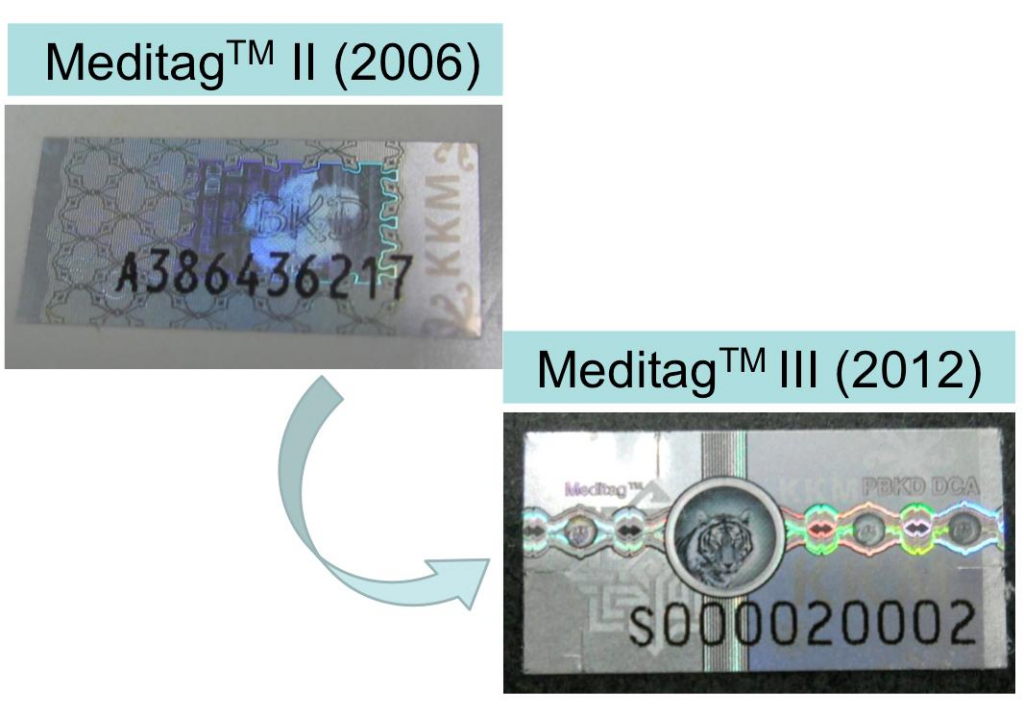From Holograms to Digital: How Malaysia Can Upgrade Its Medicine Authentication
Published on 18 April 2025

Hologram stickers: an essential tool to combat counterfeiting. (Image retrieved from Packtica)
Malaysia’s Committed Anti-Counterfeit Guardian

The predecessors of Farmatags, Meditags. (Image retrieved from Toh)
The Ministry of Health (KKM) in Malaysia has been at the forefront of combating counterfeit pharmaceutical products, ensuring public health and consumer safety. One of the key measures introduced by KKM is the use of hologram stickers on registered pharmaceutical products. The history of these stickers dates back to 2005, when Meditag holograms were first introduced to help consumers verify the authenticity of medications. These holograms have evolved over time, with the latest version being FarmaTag, which includes advanced security features such as QR codes, serial numbers, and colour-shifting technology. The positives of these stickers include providing consumers with a means to verify product authenticity and enhancing trust in the pharmaceutical industry. Consumers can use specialised decoders available at licensed pharmacies or the FarmaChecker app to check the hologram’s legitimacy.

The modern version of Farmatags, the forefront of combating anti-counterfeits. (Image retrieved from Kementerian Kesihatan Malaysia)
Despite authorities seizing nearly 100,000 counterfeit pharmaceutical products in 2023 (Malay Mail, 2023), these staggering numbers likely represent just a fraction of the illicit medicines circulating in Malaysia. Behind each undetected fake lies potential tragedy – families unknowingly risking their health with ineffective or dangerous medications that evade even our most vigilant controls.
Time For An Upgrade: The Limitations of Farmatags

A local candy is measured to be substantially larger than the Farmatags.
However, as counterfeiters have grown increasingly sophisticated, several critical limitations of the hologram sticker system have become apparent. The small size of the stickers – often just over 1cm in diameter- makes their security features extremely difficult to verify without magnification tools. The hologram stickers are so small – barely larger than a grain of rice or a housefly – that most consumers overlook them entirely when examining their medicine packages. This minuscule size, smaller than even the ‘®’ symbol on some packaging, renders them practically invisible during routine purchases, defeating their very purpose as a security measure.
Even if eagle-eyed consumers notice the hologram stickers, there is a high chance they might be unaware of their purpose or significance. This lack of awareness is compounded by the fact that public education campaigns about these stickers are often limited, leaving many consumers without a clear understanding of how to verify their authenticity. Not to mention, the authentication process itself presents additional hurdles, requiring users to download KKM’s specialised MyHealth mobile app, which can be inconvenient for consumers.
According to the National Academy of Sciences (2013), while hologram stickers can give reassurance to consumers, but it can still be duplicated with conviction. These weaknesses have been particularly exploited in the markets for lifestyle medications and essential drugs, where counterfeiters use advanced printing technology and stolen serial number databases to produce convincing fakes.
SmartKood: A friend consumer can trust

SmartKood for Real Innovation: SmartKood is beyond an anti-counterfeit tool.
SmartKood’s advanced authentication system directly addresses these vulnerabilities by implementing a user-friendly, multi-layered verification approach. Unlike the easily overlooked hologram stickers, SmartKood utilises prominent, scannable QR codes that are clearly visible on packaging—typically 2-3cm in size—making them impossible to miss during routine purchases. These dynamic QR codes provide instant verification through any smartphone camera without requiring specialised apps. The system can also incorporate public awareness features: each scan displays simple, multilingual instructions (e.g., “This product is GENUINE” with a green checkmark) and educational pop-ups about authentication, eliminating consumer confusion.
Each product is assigned a unique Smart QR code with the cutting-edge system to ensure each scan will prevent replication. The system incorporates high-tech fraud detection that utilises traceability and real-time monitoring to automatically flag suspicious duplicates or tampered packaging. This combination of user-friendly design and advanced security features provides a robust solution to the limitations of current authentication systems.
SmartKood not only helps prevent counterfeiting but also enhances customer experiences through interactive landing pages, targeted campaigns, and engaging loyalty programs. By leveraging these features, businesses can build stronger relationships with their customers, fostering trust and long-term brand loyalty. Additionally, the platform’s data-driven insights enable companies to refine their marketing strategies and deliver personalised experiences that drive higher engagement and sales.
Moving forward

SmartKood for What’s Real: Shop smarter by looking out for SmartKood QRs to avoid counterfeited items. (Image by Tarazevich from Pexels
The way forward is clear: Malaysia must embrace next-generation authentication technologies to strengthen its pharmaceutical security framework. Integrating SmartKood’s system with KKM’s existing infrastructure would create a more robust defence against counterfeit medicines – one that is both technologically advanced and consumer-friendly. This evolution from physical holograms to smart digital verification will better protect public health, restore consumer confidence, and position Malaysia as a leader in pharmaceutical safety innovation. The health of millions depends on taking this critical step forward now.
Author: Team SmartKood.
Looking to enhance your supply chain visibility and product traceability? Ready to transform your supply chain? Learn how SmartKood can help your business stay competitive!
References
Malay Mail. (2023). Health Ministry: 1,675 websites selling illegal pharmaceutical products blocked. https://www.malaymail.com/news/malaysia/2023/12/27/health-ministry-1675-websites-selling-illegal-pharmaceutical-products-blocked/109454
Packtica. (n.d.). QR Code Hologram Sticker. https://packtica.com/hologram-stickers/qr-code-hologram-sticker/
Packtica. (n.d.). Serial Number Hologram. https://packtica.com/hologram-stickers/serial-number-hologram/
Tarazevich, A. (2020). Woman With Face Mask Holding An Alcohol Bottle. https://www.pexels.com/photo/woman-with-face-mask-holding-an-alcohol-bottle-5910953/
the National Academy of Sciences. (2013). Countering the Problem of Falsified and Substandard Drugs. https://www.ncbi.nlm.nih.gov/books/NBK202524/
Toh, J. (2020). Can I buy medicines from the Internet?. https://www.doc2us.com/healthtips?keyword=Can+I+buy+medicines+from+the+Internet%3F

